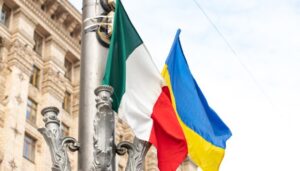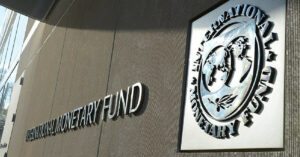
27 leading agrarian associations have expressed support for the first deputy minister of agrarian policy and food of Ukraine Taras Vysotskyy and consider unacceptable the appearance of unproven accusations, the press service of the Ukrainian Club of Agrarian Business (UCAB) reported.
“Highly appreciating the activities of law enforcement agencies in the fight against corruption, the agrarian community expresses confidence that in this case an unfortunate mistake may be made,” the statement emphasized.
Agrarian associations called the charges brought against Vysotsky “premature”, and his decisions “taken in the interests of the state and society”.
The business community noted Vysotsky’s high professionalism in the management and coordination of the industry, thanks to which it was possible to avoid disruptions in food supply and ensure food security of regions in need of immediate food aid in the conditions of a full-scale invasion.
Leading agrarian associations called on law enforcement agencies, in particular the National Anti-Corruption Bureau of Ukraine (NABU), to take into account their opinion and objectively consider all case materials, circumstances, facts and make the right conclusions regarding “one of the most decent and professional officials”.
As reported, on August 24, 2023, the information of the NABU on suspicion of Vysotskyy in committing a criminal offense consisting in the deliberate use of official position in order to obtain an undue benefit for a legal entity contrary to the interests of the state was made public.

Metinvest Mining and Metallurgical Group has allocated almost UAH 4 billion to support the country and its citizens during the year and a half of full-scale war, including UAH 2 billion for the needs of the army as part of the Rinat Akhmetov Steel Front military initiative.
According to the company’s press release on Thursday, since the first day of the full-scale Russian invasion, the company has been a reliable support for the country in a very difficult time, strengthening the defense capabilities of the army, taking care of its employees and civilian Ukrainians, and supporting the economy.
Yuriy Ryzhenkov, CEO of Metinvest, noted that the Group has been investing in the development of production and the welfare of Ukraine for all 17 years of its existence.
“With the outbreak of a full-scale war, we have faced another major challenge – to help the country defeat the enemy and preserve its sovereignty and independence. That is why for the past year and a half, the company’s enterprises have been not only witnessing but also actively participating in the struggle. We are working for the needs of the frontline, delivering humanitarian aid to the victims and, despite everything, continue to produce Ukrainian steel,” the top manager said, as quoted by the press service.
It is also stated that Metinvest’s enterprises in Ukraine are under constant threat of enemy shelling. The group’s assets in Mariupol and Avdiivka have been damaged by hostilities, while Mariupol is temporarily occupied. Since the outbreak of full-scale war, Metinvest’s operations have been negatively affected by logistical constraints, power outages, rising production costs and falling prices for certain products.
Despite all this, the Group’s enterprises operate at different levels of utilization, taking into account security, logistics, energy, economic and other factors.
Since the beginning of 2023, following the stabilization of power supply, the Group has been able to gradually increase the utilization of its iron ore assets in Kryvyi Rih to at least 30% of pre-war levels and maintain its focus on the production of pellets and products with a high iron content.
The restoration of power supply also ensured more stable operations and product mix flexibility at Kametstal, which operates two blast furnaces, and the joint venture Zaporizhstal, which operates three blast furnaces. BF No. 3 at Zaporizhstal resumed operations after being shut down in late spring. The overhaul helped improve the efficiency of the furnace and the entire blast furnace process.
Pokrovskoye Coal Group’s enterprises are operating at high utilization rates. Construction of the 11th coal mining unit is underway. In July, despite the military invasion, the Group successfully completed the modernization of the flotation department at Svyato-Varvarinskaya Concentrator, which had been in progress for four years.
Metinvest’s priority remains taking care of its employees who ensure the production process. All enterprises have bomb shelters equipped for long-term stay of people. The shelters have water, food and medicine.
Starting June 1, 2023, Metinvest introduced an additional bonus for employees of production and repair facilities in Ukraine, which can reach 25% of their salary or more depending on the performance of the employees.
The most important task for business in wartime is to work together with the whole country to win by paying taxes, supporting the army, the economy and taking care of people, the press release said. In the first half of 2023, Metinvest, including its associates and joint ventures, paid more than UAH 6.3 billion in taxes and fees to the budgets of all levels in Ukraine.
“Metinvest continues to fight the theft by the Russian Federation, which illegally exported more than 234,000 tons of the company’s steel products from Mariupol. In particular, 27 enterprises of the group have filed lawsuits with the European Court of Human Rights against the Russian Federation for damage to the group’s property in Mariupol and other territories of Ukraine since February 24, 2022,” the press release states.
Since the first day of the war, Metinvest has joined the Rinat Akhmetov Steel Front military initiative to protect the lives of Ukraine’s soldiers. The company has already allocated UAH 2 billion to support the Ukrainian army by purchasing bulletproof vests, vehicles, drones, thermal imagers and other equipment. The company has also organized the production of special mobile shelters, anti-tank hedgehogs and spiked chains against wheeled vehicles.
“Metinvest is a vertically integrated group of steel and mining companies. The Group’s enterprises are located primarily in Donetsk, Luhansk, Zaporizhzhia and Dnipro regions.
The main shareholders of the holding are SCM Group (71.24%) and Smart Holding (23.76%), which jointly manage it.
Metinvest Holding LLC is the management company of Metinvest Group.

The USAID Competitive Economy of Ukraine program announced a grant program to create and support associations of businesses into export alliances with a total funding of $1.5 million, the Economy Ministry press service said Friday.
“Grant support for export alliances will strengthen the potential of Ukrainian enterprises and encourage them to unite for common goals of conquering new markets,” USAID project manager Natalya Petrova said in a statement.
The program offers about 15 grants, ranging from $35,000 to $150,000. Applications will be accepted till September 30, 2023. Given the considerable interest, reception and consideration of applications will be held in stages on June 30 and September 30, 2023.
The Ministry of Economy added that the goal of the grant program is to support businesses seeking to jointly promote their products in international markets. The initiative is implemented in partnership with the Office for Entrepreneurship and Export Development and the national project “Dia.Biznes”.
As the press service specified, the priority sectors for grant support are information technology, engineering, manufacturing, and creative industries and services. However, this USAID program is open to applications to support other sectors that meet the selection criteria.
The USAID Competitive Economy of Ukraine (CEU) program supports start-ups and small to medium-sized enterprises (SMEs) to increase their competitiveness in Ukraine’s domestic market and in international markets, assists in the development of a simplified and transparent business climate, and provides opportunities for Ukrainian companies to take advantage of international trade. A key instrument for implementing the USAID QEU program is the $12.5 million grant program at the national scale for 2018-2023.

Italy will continue to support Ukraine and will present a reconstruction plan for the country on April 26, Italian Foreign Minister Antonio Tajani said.
“In a telephone conversation with Dmitry Kuleba, he confirmed his support for Ukraine,” he wrote on Twitter on Tuesday.
“On April 26, we will present a plan for the reconstruction of Ukraine. We will perform together with our best companies,” he specified.
Tajani said he is in constant contact with IAEA head Rafael Grossi and stressed the importance of protecting the occupied Zaporizhzhia NPP. “It is extremely important to protect the Zaporizhzhya power plant,” he wrote.
As reported, Ukrainian Foreign Minister Kuleba held a conversation with Tajani on Tuesday, during which the sides discussed new possible assistance that Italy could provide to ensure Ukraine’s victory over Russian aggression.
It was also reported earlier that a conference on reconstruction and rehabilitation of Ukraine will be held in Rome at the end of April.

The International Monetary Fund’s four-year extended EFF financing program for Ukraine also envisions the country receiving $80 billion from multilateral and bilateral donors during this period, including $20 billion in grants and $60 billion in concessional loans, as well as another $20 billion in debt flow relief, said Gavin Gray, head of the Fund mission.
At a press conference on Friday, after announcing the decision to approve the $15.6 billion EFF program, he recalled two announcements made last week: from a group of official Ukrainian creditors about their willingness to defer the country’s debt payments for the program period and about Ukraine’s intention to agree the same with the holders of Eurobonds and other external commercial debts.

President of Ukraine Volodymyr Zelenskyy and Prime Minister of Iceland Katrín Jakobsdóttir signed a joint declaration during her working visit to Kyiv, the presidential press service has said.
According to the document, the leaders reaffirm their support for the principles of international law, the inviolability of borders, and their demand for Russia immediately, completely and unconditionally withdraw all its military forces from the territory of Ukraine within its internationally recognized borders.
The President of Ukraine and the Prime Minister of Iceland remain fully committed to the policy of non-recognition of Russia’s illegal annexation of the territories of Ukraine, and also call for the immediate release of all abducted civilians, including children, and all those who were forcibly transferred to the territory of Russia.
The declaration notes the importance of Ukraine’s consistent efforts of continuing the Black Sea Grain Initiative and the Grain from Ukraine humanitarian program, Ukraine’s sovereign decision to guide the peace process and convene a global peace summit when conditions permit, and commitment to NATO’s Open Door Policy.
Condemning in the strongest possible terms Russia’s full-scale military invasion of Ukraine, Zelenskyy and Jakobsdóttir declare that Iceland fully subscribes to the European Union sanctions imposed against Russia in response to military aggression against Ukraine.
In turn, Ukraine highly appreciates all the help from Iceland.
It is noted that Iceland will continue to provide effective political, economic and humanitarian support to Ukraine and its defense capability. Iceland will assist in the recovery and rapid recovery of Ukraine, especially in the energy sector. Iceland will support Ukraine for as long as it takes.
Iceland and Ukraine will continue to work together, and with others within multilateral organizations, to ensure accountability, including through the establishment of special tribunal for the crime of aggression and a register of damages to record and document evidence and claims for damage, loss or injury as a result of Russia’s aggression against Ukraine, as a first step in setting up a comprehensive reparation mechanism.